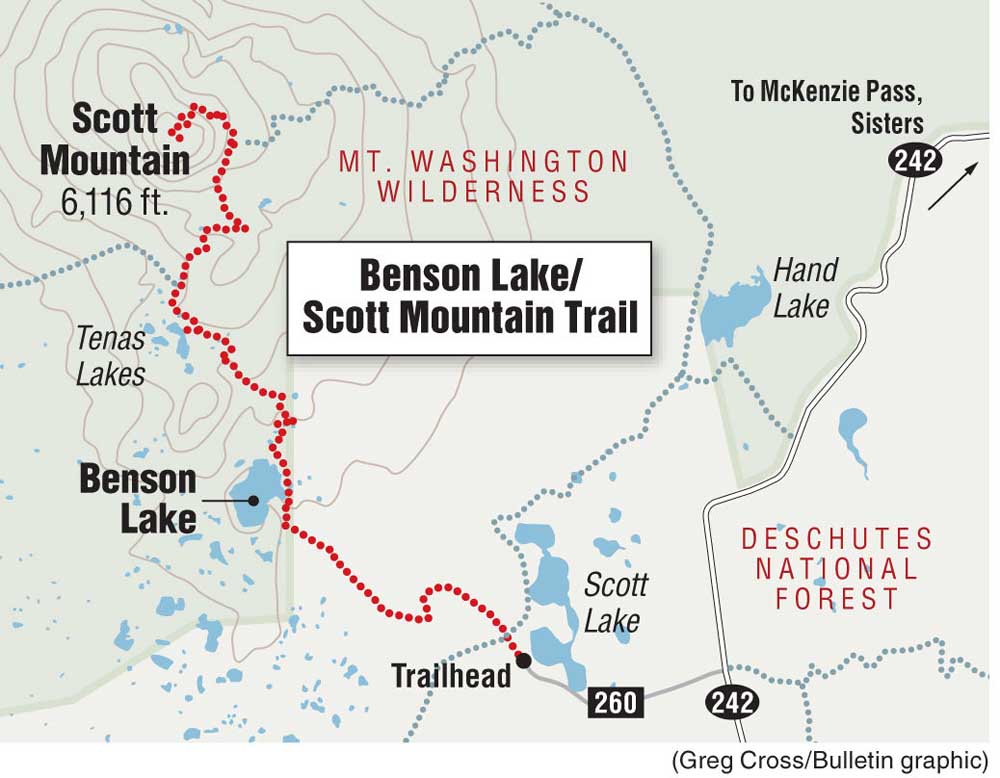Hiking to Benson Lake/Scott Mountain
Published 12:00 am Friday, July 20, 2018

- Hiking to Benson Lake/Scott Mountain
McKenzie Pass is a veritable treasure trove for hikers seeking high-mountain scenery in the form of snow-capped Cascade peaks, pristine alpine lakes and rugged lava flows.
And luckily for hikers, most trails in the area are now open after the Old McKenzie Pass Highway (state Highway 242) reopened last month after it was closed last Aug. 17 in the wake of damage caused during the Milli Fire.
Trending
The fire burned more than 24,000 acres in the Three Sisters Wilderness about 7 miles southwest of Sisters and dramatically altered the landscape in the area.
One trail that remains closed is the Black Crater Trail, which climbs steeply to the summit of 7,257-foot Black Crater through much of the burned area.
Kassidy Kern, public affairs specialist for the Deschutes National Forest, said trail crews have cleared about 500 trees in the Black Crater Trail area and are working on rehabilitating the trail where necessary.
“But for the most part everything is open,” Kern said. “We would just remind folks to use caution in burned areas and stay on the trail. We encourage people to be cautious when they are traveling through areas that have dead trees. Make sure you know where you’re camping, and if you’re in a wind event, have your wits about you. Just exercise good judgment and caution.”
The burned trees stood out to me as I drove along the highway toward the 5,325-foot summit of McKenzie Pass last week. What was once a thick, green forest was now just endless acres of black, limbless trees, with views of Mount Washington that previously did not exist.
The original plan was for my 10-year-old son Mason and I to hike Black Crater. But with that not possible we settled on a hike to Benson Lake, with the option to summit 6,116-foot Scott Mountain just west of the pass in the Mount Washington Wilderness.
Trending
The trailhead is located at Scott Lake, a popular camping and kayaking location high in the Cascades. From Scott Lake, we left the trailhead and climbed steadily through a thick subalpine forest, the trail blanketed by small pine needles.
It was not long before mosquitoes started attacking — and of course I had forgotten the insect repellent. According to wire service reports, Oregon officials predicted a high number of mosquitoes this summer. The mild weather during the past winter and spring reportedly has led to a dramatic increase in mosquitoes, which presents a higher risk for mosquito-transmitted illnesses, including West Nile and Zika. The Deschutes National Forest website notes that “mosquitoes are thick around some high elevation lakes and waterways.”
The relentless swarms of the bloodsuckers persuaded us to cut our hike short. We did make it to picturesque Benson Lake, but we did not linger for long near the water. In some areas along the trail the mosquitoes were so bad that we ran to escape them. (Moving faster generally seems to give the little buggers less of a chance to land on you.)
By the time we had run/walked back to the trailhead, we had gone 4 miles, which seemed like a pretty good distance given the situation.
For those who remember the bug spray — or make the trip later in the summer when the mosquitoes typically dwindle — the 8-mile round-trip hike to Scott Mountain is well worth the effort. I completed the hike three years ago.
From Benson Lake, the trail takes hikers past the turquoise Tenas Lakes before climbing steeply up Scott Mountain along switchbacks with views of Mount Washington, Three Fingered Jack and Mount Jefferson.
Long yellow grass covers much of the summit of Scott Mountain, making room for sweeping, unobstructed views of the Three Sisters just a few miles to the southeast.
While views of Cascade peaks abound on many hikes in Central Oregon, one aspect that sets Scott Mountain apart is its ample vistas of the rugged, green hills of the western side of the Cascades. The nearly 360-degree panorama atop Scott Mountain reveals the wide variety of terrain in Oregon, from the craggy, rocky peaks of the Cascades to the rolling green slopes of the Willamette Valley.
But hikers may need to fight the wrath of mosquitoes to make it to the top.
— Reporter: 541-383-0318,
mmorical@bendbulletin.com








